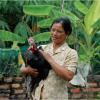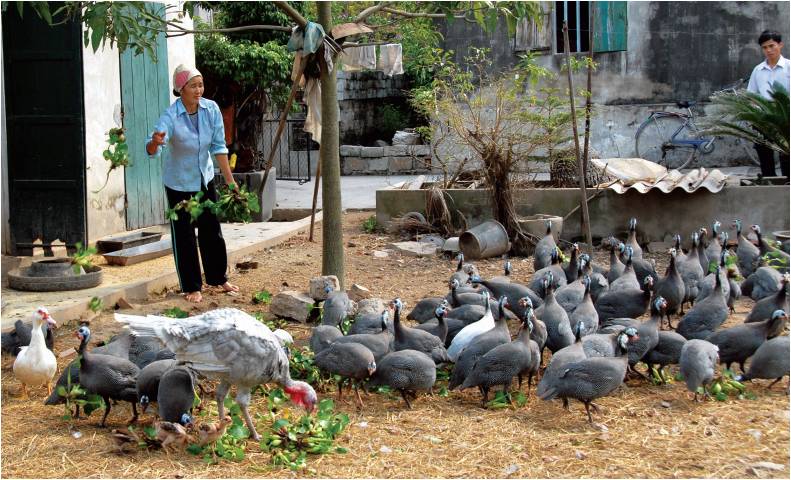
Sustainable rural development by developing agriculture with special regard to family farms and environmentally friendly exploitation of natural resources.
In the countries of South-East Asia agriculture is of great importance from the point of view of economy and diminishing poverty. The contribution of agriculture to the GDP is very high, and in addition to that, the majority of the population is employed in agriculture (and food industry). In South-East Asia small producers farm on the 90 % of cultivable land and they produce 70 % of agricultural products. The small family farms are typically not specialized, mostly capital short, especially in the underdeveloped regions, but at the same time they are complex units of crop and animal production, often complemented by aquaculture.
Therefore, the development of agriculture – and mainly that of small farms – is essential in the countries of South-East Asia for rural development and to fight poverty. Production of poultry-based products in the small family farms is very important. Besides self subsistence of families it provides a source of income earning. Furthermore, they contribute a lot to the provision of animal protein to city dwellers. Poultry meat and eggs are traditionally very popular foodstuffs in these countries. Products made of traditional breeds are preferred to those of modern breeds manufactured under industrial conditions.

There is an outstanding biological diversity of domestic animals in South-East Asia, thus the raw material needed to produce quality food is available. However, there is still a lack of developments which could serve the effective breeding of various breeds and their husbandry in ecological integration in spite of the fact that these countries subsidise quantitative and qualitative improvement of domestic food supply and the production of exportable foodstuff.
It is typical in South-East Asia that many nationalities live next to each other; many times the given nationalities live right along the borderline drawn between countries. For that reason cross-border regional co-operations become absolutely necessary in course of the development of these areas. There have already been some precedents for such a co-operation – partly with Hungarian participation – first of all between Vietnam and Laos. This cross-border co-operation allows us to spread breeds, technologies and knowledge adapted to Vietnamese circumstances in Laos.
Because of the above mentioned, it is evident that from the point of view of making developments in the countries of South-East Asia the improvement of agricultural small farming and complex family farms plays a key role. For this the following is needed:
- suitable extensive breeds, which can be traditional Hungarian (landrace) breeds and local breeds, respectively. In the latter case breed survey and gene conservation are the type of tasks in which we have long standing experiences;
- training of experts and farmers in order to improve production;
- marketing an organization of the trading of products manufactured by small producers, including cross-border trading;
- trading locally and in towns;
- improvement of food safety: organization of the entire production chain and buying, development of food safety systems from the farm to the consumer, establishment of a background for quality control laboratories.
In respect of extensive breeds the introduction of Hungarian breeds has been under way in Vietnam and Laos for many years. Both poultry (chicken, guinea fowl and turkey) and rabbit breeds have well acclimatized and with the help of local research institutes (POREC, NAFRI) they are spreading in rural areas. Additionally, training of farmers has been started as well, partly with the involvement of Hungarian specialists. These already existing projects can be excellent pilot-projects for further co-operations. Development of marketing and food safety represents, of course, further tasks. Products manufactured by a given nationality are ordinarily consumed mainly by the members of the same ethnical group, therefore it cannot be expected that these products would spread in regional or national markets. On the other hand, these nationalities often live not only within the borders of a single country, thus their products may get into a trade that extends to a small, but cross-border region. It is very important to market these products locally, moreover, in a controlled, excellent quality, but they also need to contribute to the food supply of nearby towns, and that requires a well established marketing and logistics activity.
Regarding food safety the regulation, control and organization of the entire production chain is an important task on the one hand. It is not enough to develop an appropriate production system in the farms, but the improvement of food safety conditions (sanitation, chemical-freeness, etc.) has to be guaranteed hereafter. To achieve that the establishment of a buying system is needed, that is heavily connected to the field of marketing. However, appropriate slaughtering of produced poultry and reaching the markets are also necessary. Mobile slaughter houses would be a solution for slaughtering poultry produced by small producers, in villages and small towns. Processing lasts until the manufacturing of oven-ready poultry products, including adequate packing.
In respect of food safety not only the assurance and control of hygienic conditions are indispensable, but different materials harmful to health (chemical residues, mycotoxins, etc.) also have to be examined. Hungary would be able to provide the necessary expertise and experience for that, including the establishment of a suitable background for setting up laboratories and the training of specialists – from taking samples to making analyses.
Hungary can participate in an efficient way in this development, because we have experience in the establishment of a buying system. This system needs to be voluntary, and it has to be ensured that small farms would not get at a disadvantage. Furthermore, it also has to be ensured that the retail system widespread in South-East Asia would not be impaired due to the new system.
It should not be forgotten either, that Hungary has conventional cooperation with several countries in the South-East Asian region, first of all with Vietnam and Laos. Many specialists trained in Hungary work in these countries and both institutional and informal contacts are good. These can be useful in the course of further co-operations.
Hungary, more exactly the Institute for Small Animal Research and Co-ordination Centre for Gene Conservation (KÁTKI) and theSociety of Hungarian Small Animal Breeders for the Conservation of Genetic Resources have co-operated with Vietnamese partner institutions for many years. These are the National Institute of Animal Husbandry (NIAH), the Poultry Research Centre (POREC), as well as Can Tho University and Tra Vinh University. Recently this co-operation has been extended to Laos, as well, where the co-operative partner is the National Agriculture and Forestry Research Institute (NAFRI). Co-operations have also been supported by the Hungarian and Vietnamese governments (by grant applications of NEFE and TéT on the Hungarian side). Through these projects KÁTKI and MGE have developed a system of close co-operation in the region rare in Europe and unique in Hungary.
As a result of our projects we managed to naturalize the Gödöllő types/varieties of New Zealand and Californian white rabbit breeds and traditional Hungarian breeds of chicken, guinea fowl and turkey. Production parameters (first of all that of prolificacy) of turkeys (Copper and Bronze Turkeys) have even exceeded the results experienced in Hungary. With the help of POREC these breeds were allocated also to small producers where they gave a proof again of their good production traits under extensive conditions, as well, in various regions of Vietnam. These projects are still running on small scale today, but getting the produced goods to the market is not organized yet, right because of the relatively small quantity of products. It can be stated, however, that there is a demand for the products made of traditional Hungarian poultry breeds, the turkey and guinea fowl meat is popular, and people often come for them travelling long distances. Based on that, it is evident that products manufactured in a larger quantity and at an appropriate level of procession paired with adequate marketing could be passed easily to the markets of towns and tourist centres.
The work carried out in Laos based on the experiences gained in Vietnam provided similar results. There is an existing demand for the products, the breeds have also acclimatized well, and we have gained reliable experiences in a trilateral co-operation. Our Vietnamese partners have partly taken over the adapted breeds, the technologies and the knowledge of Hungarian experts, and have passed it over to their partners in Laos, with the help of Hungarian specialists, of course. Expertise in trilateral co-operation will ease the extension of our work to Cambodia and other countries of the region later on.